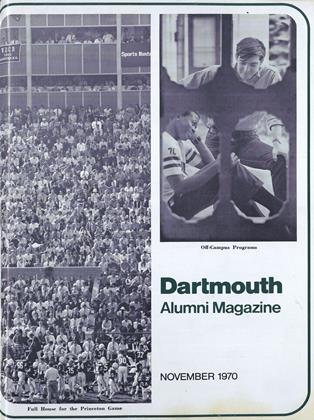WILHELM BUSCH, BALDUIN BÄHLAMM,DER VERHINDERTE DICHTER.CLEMENT DOVE, THETHWARTD POET
(Bilingual Editor).Translated from the German by Prof.Walter W. Arndt (Russian). Gutersloh(Germany): Sigbert Mohn Verlag, 1967.79 pp. With 109 cartoons by Busch. Paperback. DM. 9:80.
The roots of Wilhelm Busch (1832-1908), born in a village near Hannover, Germany, are embedded in the soil, and his language and illustrations have a country bumor and earthy flavor. Be ready to guffaw at such bucolic pleasantries as a frog in uncle's tobacco box and at vermin in beds, whacks from burly peasants, bungling bumpkin doctors, a cat sneaking up on a bird singing its Licbestod, and humorous boys hauling a roasting chicken they killed up a poor widow's chimney.
The first chapter praises the happiness and fulfillments in becoming a poet. In "the realm of light and buoyattce," where he is "rid of all annoyance," he may "gather and decant in his hygienic dairy plant" "the magic oozes" which are forever seeping from "the dugs of buxom Muses." And so with the promise of poetic butter the poet issues from the glooms and tensions of the world "into the poets' fifth dimension." "(The fourth is full of cosmic mist/And rank with ghosts and physicists.)"
The story relates how a clerk, Clement Dove, father of four children, dreams of versifying, but because his poetic dreams seem often to degenerate into scabrous burlesque, he is prevented from transcribing his visions. An expedition to the country gives him neither the leisure nor the opportunity to do anything except right himself from pratfalls physical and spiritual. Sodden with rain, the poetaster views a goat girl as a shepherdess. With playful Arcadian humor he attempts to adorn her bosom with a posy. She hauls off and socks him, and the slap reverberates like a clap of thunder as he falls over backwards.
Busch's language is witty and colloquial, and his cartoons match his verses, or, rather, they complement each other. What because of enforced brevity the lines omit, the cartoons fill in, and a reader enjoys a double stimulus.
The problem of translation, faced when Professor Arndt had a soft spot in his heart for the poet and a soft spot in his lungs requiring treatment in a new-world Zauberberg, was to catch the winged originality of phrasing and rhyming when a literal rendition would be awkward, unidiomatic, and even unfunnily absurd. Begeistert blickter in die Hoh: "Willkommen, herrlicheIdee!" is given as: Oh vision graceful andappealing! Enraptured he adjures the ceiling. The vision was the fulfillment of: 's istabgetan.—Das Baupt gesenkt, Steht erschon wieder da und denkt. Arndt translates freely: Now let us hope he beats the jinx.He stands by his prieu dieu and thinks. The cartoon makes clear that the prayer-stool is an old-fashioned writing desk at which the bemused versifier stands to compose.
With racy American flavor, the translations of Professor Arndt are as lively as they are deft. To Europeans, Busch may seem a Gogol writing Pushkinian verse, illustrated by Daumier. Americans may enjoy Busch-Arndt as a happy amalgamation of Ogden Nash and Thurber, illustrated by a freshly inspired Al Capp.
 View Full Issue
View Full Issue
More From This Issue
-
 Feature
FeatureWhat Is a Conservative?
November 1970 By NORMAN LAZARE '40 -
 Feature
FeatureOpportunities for the Coming Year
November 1970 -
 Feature
FeatureThe Boom in Off-Campus Study
November 1970 By JAMES L. FARLEY '42 -
 Feature
FeatureALUMNI ALBUM-30
November 1970 By —BARBARA BLOUGH -
 Article
ArticleBig Green Teams
November 1970 -
 Article
ArticleThe ROTC Decision: An Explanation
November 1970 By ARTHUR LUEHRMANN
Books
-
 Books
BooksESQUIRE FASHION GUIDE FOR ALL OCCASIONS.
May 1958 -
 Books
BooksTHE BIRDS OF MASSACHUSETTS AND OTHER NEW ENGLAND STATES
MAY 1930 By B. B. Leavitt -
 Books
BooksALL THE BEST IN THE MEDITERRANEAN
March 1952 By John B. Stearns '16 -
 Books
BooksHow YOU REALLY EARN YOUR LIVING.
October 1952 By L. G. Hines -
 Books
BooksGENERAL AND SPECIFIC ATTITUDES
MAY 1932 By Maurice H. Mandelbaum -
 Books
BooksNEO-CONFUCIANISM, ETC.: ESSAYS BY WING-TSIT CHAN.
MARCH 1970 By SHU-HSIEN LIU

